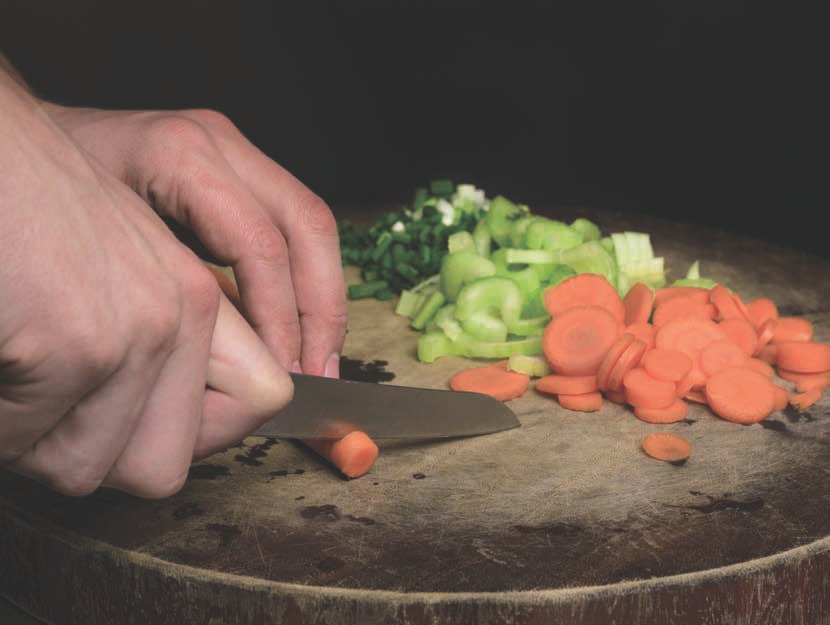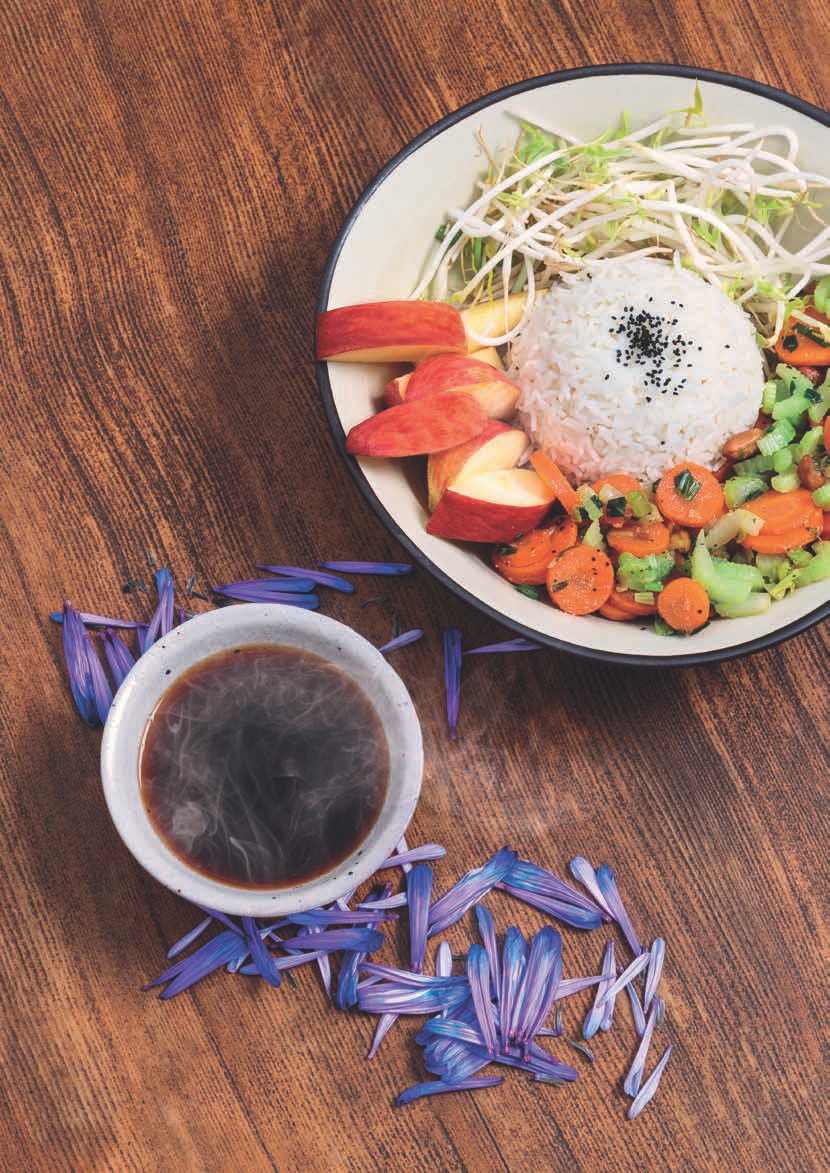
 |
|
Cooking is not a mystery. The more heart we put out, the more heart we put in. To bring cooking alive, we give our life. Giving our life willingly, we don't get put out. Washing, cutting, cooking, cleaning, exploring ways to give life to our life. Not knowing already how and what to do, practice feeling it out of what is not known through the warmth and anxiety, not sticking to a particular way, insisting it is the only way, even though it is quite good; open to feeling the various possibilities, the tentative ways of giving life to our life. To feel out our left hand, our back, our toes, to feel out our breathing, our movements, our stance, this is our freedom, this is our wisdom. The mystery is that it is possible to do what we don't know how to do.

Before I say anything else, I want to say this: Everyone can be a cook. In the words of Edward Brown "Cooking is not a mystery... To be a cook, all you need to do is cook." That is it. The only thing stopping you from cooking is the fact that you are not in the kitchen. Of course, there is an element in cooking that is about getting things right. We want to offer food that is "nutritious and delicious," as Wu De often says, but this is not what it means to truly cook. Cooking is about giving ourselves, and those around us, life. Even in the most basic way, life could not continue without food. If we look deeper, we see that cooking invites us to awaken to what it really means to live: to serve with love, to transcend the seemingly mundane into the sacred, and, most importantly, to deeply touch this life and allow the world to touch us back. Food is precious; we are precious, too. If we allow our hearts to delight in this, we are cooks, no matter how any dish turns out!
The life on this Earth is energy moving forward from lost eons. When we cook, we hold this existence itself in our hands. These very vegetables are expressions of the whole world - a carrot, a cabbage and a bowl of rice all have the Universe singing through them. They are gifts, full of the same life-force that courses through us. To quote Rumi, "What was said to the rose that made it open, was said to me here in my chest." When we start to feel this connection, and start to cultivate reverence for ourselves, our food and our guests, we can begin to give life through our cooking. We are then no longer working only with the food but with others and ourselves as well. Through sharing food, we begin to grow kinder, more generous and openhearted. We let go, piece by piece, of the desire to gain approval through our cooking. Cooking is a gift, an expression of love, and should be given without expectation. Cooking gives us the opportunity to bring our love into the world, giving it form, smell, aroma and taste. When we cook, love is no longer abstract. It flows from our hearts into our hands, and then is absorbed and becomes those we serve it to.
Perhaps here, if we pause, we see the parallels to serving tea. In truth, they are very much the same in approach. Both tea and cooking allow us to reach inside ourselves and find ways to express and share our love. Cooking also invokes the Four Virtues of Tea: harmony, reverence, purity and tranquility. They are also both a medicine for our modern lives. More importantly, tea and a meal both provide us an opportunity to sit down and be with each other, connecting and honoring the time we share. Cooking is also a road to the transcendental through the mundane, turning our chores into joy.
If you are a true Chajin, you will know that tea is not merely the pouring of tea. Wu De's Zen master always said that "Cha Dao is 80% cleaning." And the Zen master Dogen also discussed how important cleaning is to the art of cooking. Both cooking and tea are in many ways just good old-fashioned work. From cutting an onion to cleaning the dust under the tea table, we work with our hands - breathing life back into our poor hands, which so many of us neglect these days. Tea and cooking give us the opportunity to see all the small chores in our lives as not just something to get out of the way so we can get to the eating or drinking that follows, but as an important part of our eating and drinking. We all need to learn the important lesson that if the preparation isn't done well and with heart, the enjoyment will never be appreciated in that way - and that goes for all things!
Cooking is a way to connect with the intimacies of living - to be connected with our life and the moments it embodies. Our senses are already awake and alive. Are you with them, or are you waiting for some future moment when they will align in a way you think you will enjoy them more? That moment is not coming, and if it does, it will pass like this one. Tea and cooking teach us to enter the process for its own sake. They ask us to find our joy and fulfillment in our daily chores, allowing these simple moments to awaken bliss within us.
I think much of this is what we miss in our approach to food. It seems many of us are struggling for sensual pleasure, filling emotional holes through eating - holes that cannot be filled in that way. The healthier of us are often lost in searching for the golden mean - the perfect diet. Yet all that really happens is that we bounce from one extreme to another. We act as though nothing is palatable until we make it so, be that by drowning it in ketchup or becoming militant around gluten. In both cases, our attention to making food how we want it actually draws away from the beauty of the process itself. We get lost in the plate and lose the kitchen. We stop smelling the aromas, hearing the sizzles and clanks, enjoying the company we sit with, and instead focus on how we wish the meal was other than it is. This is not to say that certain dietary needs aren't real or important, but just that they can get in the way of the art of cooking and the connection with Nature and others we can experience through food.
Edward Brown talks about dealing with these same issues in the sixties, when he was the head cook at the Zen center Tassajara. Around a third of the community followed a macrobiotic diet and only wanted to eat brown rice, chewing it hundreds of times before swallowing! While this had little to do with Zen, he was obliged to cater to them as they made a big deal about it. "They used to say that if one followed the proper diet, then one would feel peaceful and happy. Apparently this was true, because when they didn't have their proper food, they were outraged." He lightheartedly refers to this time in the Zen center as living under the tyranny of a diet plan! Even fifty years ago people had rigid ideas around food that perhaps got in the way of experiencing the intimacy of the moment.
I have heard Edward say that, for a long time, he tried to cook in a way that everyone would like and would make everyone happy, and all that did was make him depressed! He reflects on this experience through the nadir of the Buddha's First Noble Truth: life is suffering. We can never make everyone happy; we can never cater to every ego. True cooking is not about making people happy. Moving the focus of cooking away from things like attaining love or admiration from others to a process of self-transformation, we begin to see cooking in its most sincere form is about putting our whole heart into the fundamentals of being alive, which in turn breathes life back into the world around us. Cooking can be an offering on the altar of Creation. As we develop in our practice, we start to respond to the circumstances, becoming inspired and directed by the ingredients themselves, the season and our guests, much like with a tea practice. At this point, we no longer see cooking as "work" to get out of the way, but as the Way. Then we serve life to life with our life. These are the dishes we strive to serve everyday on the poignantly round dining table of the Center. And, there's always a seat and a dish at our table waiting for you!

